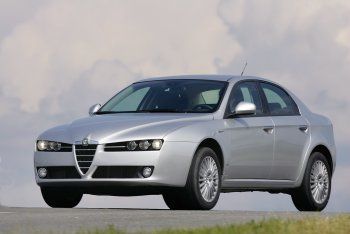 |
|
The Ontario government is reported to have
held a series of recent meetings with Fiat
Group officials as the Canadian province
makes an aggressive pitch to become the
North American location for Alfa Romeo
production. |
|
|
|
Alfa Romeo,
the Italian sports car best known as Dustin Hoffman's
runabout in The Graduate, is returning to North America,
and Ontario is making a strong pitch to persuade the
company to assemble cars in the province - write Eric
Reguly and Greg Keenan in the Globe & Mail.
Sources said the
Ontario government has held a series of meetings in recent
weeks with officials from Fiat Group, the Italian auto giant
that owns Alfa Romeo, Ferrari, Maserati and other brands.
“Ontario is aggressively selling itself,” said a source
familiar with the talks.
Fiat spokesman
Gualberto Ranieri would not confirm or deny the meetings. He
would only say that Sergio Marchionne, Fiat's
Italian-Canadian chief executive officer, “envisages making
at least one Alfa Romeo model in North America” before 2012
and that sites across North America are being considered.
The province is
looking to offshore auto makers for new investment and jobs
amid plant closings and job cuts by the Detroit Three auto
makers that have battered the Ontario economy. In addition to
Fiat, the province has made a strong push to entice
Volkswagen AG, which is embarking on a North American
expansion, but appears to have chosen the southeastern
United States for a new assembly plant.
Any successes in
landing new investment would build on the Ontario Automotive
Investment Strategy, a $500-million fund that has helped
land a new Toyota Motor Corp. factory scheduled to open
later this year in Woodstock, Ont. It will join an existing
Toyota operation that is the only plant outside Japan to
build vehicles for the auto maker's luxury Lexus line. Honda Motor Co.
Ltd. is constructing an engine plant in Alliston, Ont.
Mr. Marchionne
has talked openly since December about building Alfa Romeos
in North America, where they have not been sold since 1995. He could not be
reached for comment about the Ontario meetings. He would know
the Ontario market well. He was born in Italy, but was
raised and educated in Ontario, where he obtained a law
degree from Osgoode Hall Law School. His mother still lives
in Toronto and he travels to the city about every six weeks
to visit her.
The first decade
of Mr. Marchionne's career was spent in Canada in senior tax
and finance roles at Deloitte & Touche and Toronto packaging
company Lawson Mardon Group. He became Fiat's CEO in 2004,
when the company was almost bankrupt, and turned it around –
to the point where it now is one of Europe's fastest-growing
and most profitable auto groups.
Fiat wants a
North American Alfa Romeo factory, partly as a hedge against
a rising euro that is eating into profit margins for all the
Europe-based auto makers that export to the U.S. market.
Volkswagen's only North American plant is in Mexico, and the
German company also wants to take advantage of the decline
in the greenback that has helped turn the U.S. into a
low-cost vehicle assembly location.
Mr. Ranieri said
Fiat would most likely form a joint venture in North America
or construct an Alfa Romeo assembly line at one if its
existing Case New Holland factories, which build tractors
and other agricultural equipment. If the CNH
option is chosen, Ontario would be out of luck. CNH has 12
plants in the U.S. and one in Canada – in Saskatchewan.
The logical
partner in North America is Chrysler LLC, which is seeking
alliances to develop its own international growth strategy.
Although it has excess production capacity in North America,
almost all of it is in the United States. Fiat uses joint
ventures for much of its overseas assembly, including links
with India's Tata Group and Chery Automobile in China.
Ontario's pitch
to Fiat centres on the depth of its automotive expertise –
the province builds more cars than Michigan – and
potentially lavish financial incentives. Two funds would
be offered to lure Alfa Romeo. The automotive
investment strategy was set up in 2004, but has been almost
entirely paid out to support investments by Chrysler, Ford
and GM. Ontario also offers the $1.15-billion Next
Generation Jobs Fund, whose goal is to create jobs in
manufacturing, health care, pharmaceuticals and
environmental technology.
Report courtesy
of the
Globe & Mail
|